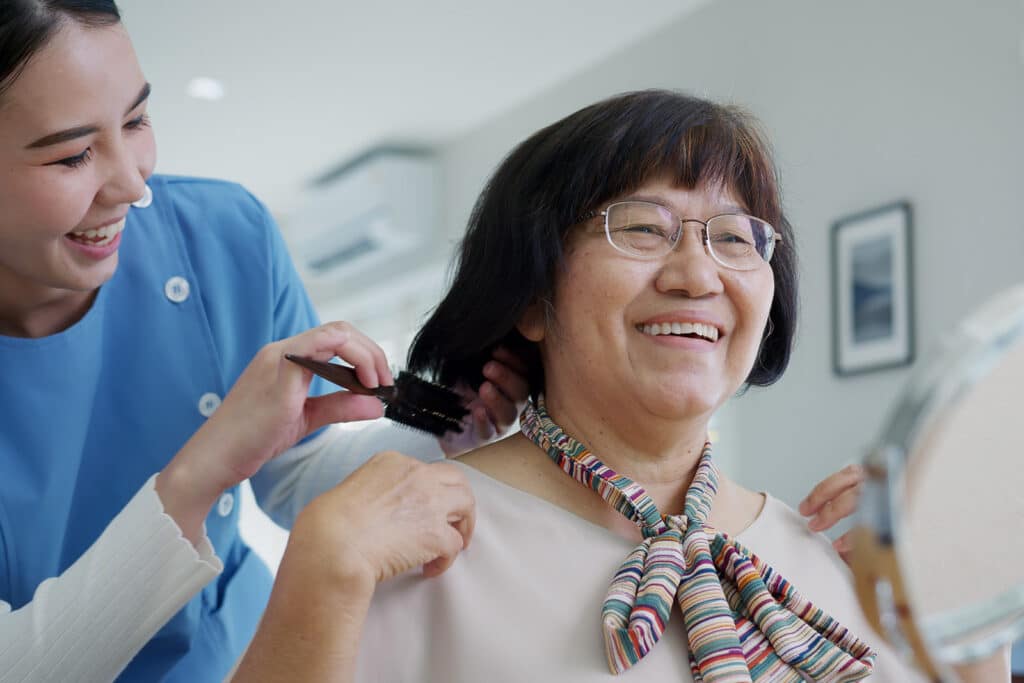Senior Home Care
Families hire us to help their loved ones remain as independent as possible in the comfort and safety of their own home. Our clients hire us because we fully understand their specific needs. We know their care is personal and individual. Our families trust us to assist their aging loved ones because we can give them customized care from a local, family owned business.
Our main office numbers are answered 24/7 by a member of our office team. So, no matter when you or your loved one have an emergency situation, you can always reach us. If your caregiver has an emergency, our office team gets right to work on it and we have somebody else ready and available to cover those hours.
As people age, they may require assistance with daily activities that once came easily. The need for senior home care can arise for a variety of reasons, including physical limitations, medical conditions, or cognitive decline. While many seniors prefer to stay in their own homes for as long as possible, this can create challenges for family members who serve as caregivers. Fortunately, senior home care services can help keep seniors safe and comfortable at home, providing peace of mind for both the senior and the family.
"Home is where the heart is, and for seniors, it is also where they feel the most comfortable and secure. Senior home care allows seniors to continue living in their own homes, surrounded by familiar surroundings and memories, while receiving the care they need."
What is Senior Home Care?
Senior home care refers to a range of services provided in the home to help seniors with daily activities. This can include companion care, personal care, and medical care, depending on the individual’s needs. The goal of senior home care is to allow seniors to continue living at home, even as their needs change over time.
- According to the National Association of Home Care and Hospice (NAHC), approximately 90% of seniors prefer to receive care at home as they age. (Source: NAHC)
- A study by the AARP found that home care is significantly more affordable than nursing home care. (Source: AARP)
The same AARP study found that home care is also more convenient for seniors, as they can receive care in their own homes, surrounded by familiar surroundings and memories. (Source: AARP)
Providing Senior Home Care Services within 90 miles of Charlotte, Raleigh, Cary, Chapel Hill, Greensboro, Winston-Salem, and Southern Pines.

Companion Care
Companion care is a type of senior home care that focuses on providing socialization and emotional support. This can include activities such as conversation, playing games, or simply being present for the senior. Companion care is particularly important for seniors who live alone, as it can help prevent loneliness and depression.

Types of Services Included with Senior Home Care
Personal Care Services
Personal care services, as mentioned earlier, include assistance with ADLs such as bathing, dressing, and grooming. Home care providers can also help with light housekeeping, meal preparation, and medication reminders.
Companion Care Services
Companion care services include activities such as conversation, playing games, and accompanying the senior on errands or appointments. This type of care is designed to provide emotional support and prevent loneliness.
How Can Families Help Seniors See the Value in Senior Home Care Services?
For some seniors, the idea of receiving care at home can be intimidating or overwhelming. However, there are many benefits to senior home care that can help convince a senior that this type of care is important.
- First, home care allows seniors to continue living in their own homes, surrounded by familiar surroundings and memories. This can be especially important for seniors who have lived in their homes for many years and have strong emotional ties to the place.
- Second, home care can help improve safety in the home. By providing assistance with tasks such as bathing and using the bathroom, a home care provider can reduce the risk of falls and other accidents.
- Finally, home care can provide emotional support and socialization, which can help prevent loneliness and depression. For seniors who live alone, a home care provider can be a trusted friend and companion, helping to maintain their independence and quality of life.
Personal Care
Personal care is another type of senior home care that focuses on helping seniors with activities of daily living (ADLs). This can include assistance with bathing, dressing, and grooming, as well as help with incontinence care and mobility. Personal care can also include assistance with light housekeeping and meal preparation, which can help seniors maintain their independence and quality of life.
The Benefits of Senior Home Care
Safety in the Home
One of the biggest benefits of senior home care is improved safety in the home. Many seniors face safety challenges, such as tripping hazards or difficulty with mobility, that can be addressed with the help of a home care provider. A home care provider can help seniors with tasks such as bathing, using the bathroom, and getting in and out of bed, reducing the risk of falls and other accidents.Better Quality of Life
Senior home care can also help improve the quality of life for seniors. By providing assistance with ADLs, home care providers can help seniors maintain their independence and dignity. Additionally, companion care can provide seniors with much-needed socialization and emotional support, which can help prevent loneliness and depression.Peace of Mind for Family Caregivers
Finally, senior home care can provide peace of mind for family caregivers. Family members who serve as caregivers often face a range of challenges, from physical exhaustion to emotional stress. By relying on home care services, family caregivers can take a step back, knowing that their loved one is in good hands."Senior home care is not just about providing practical assistance, but also about providing emotional support and a sense of community. A home care provider can be a trusted friend and companion, helping seniors to maintain their independence and quality of life."






